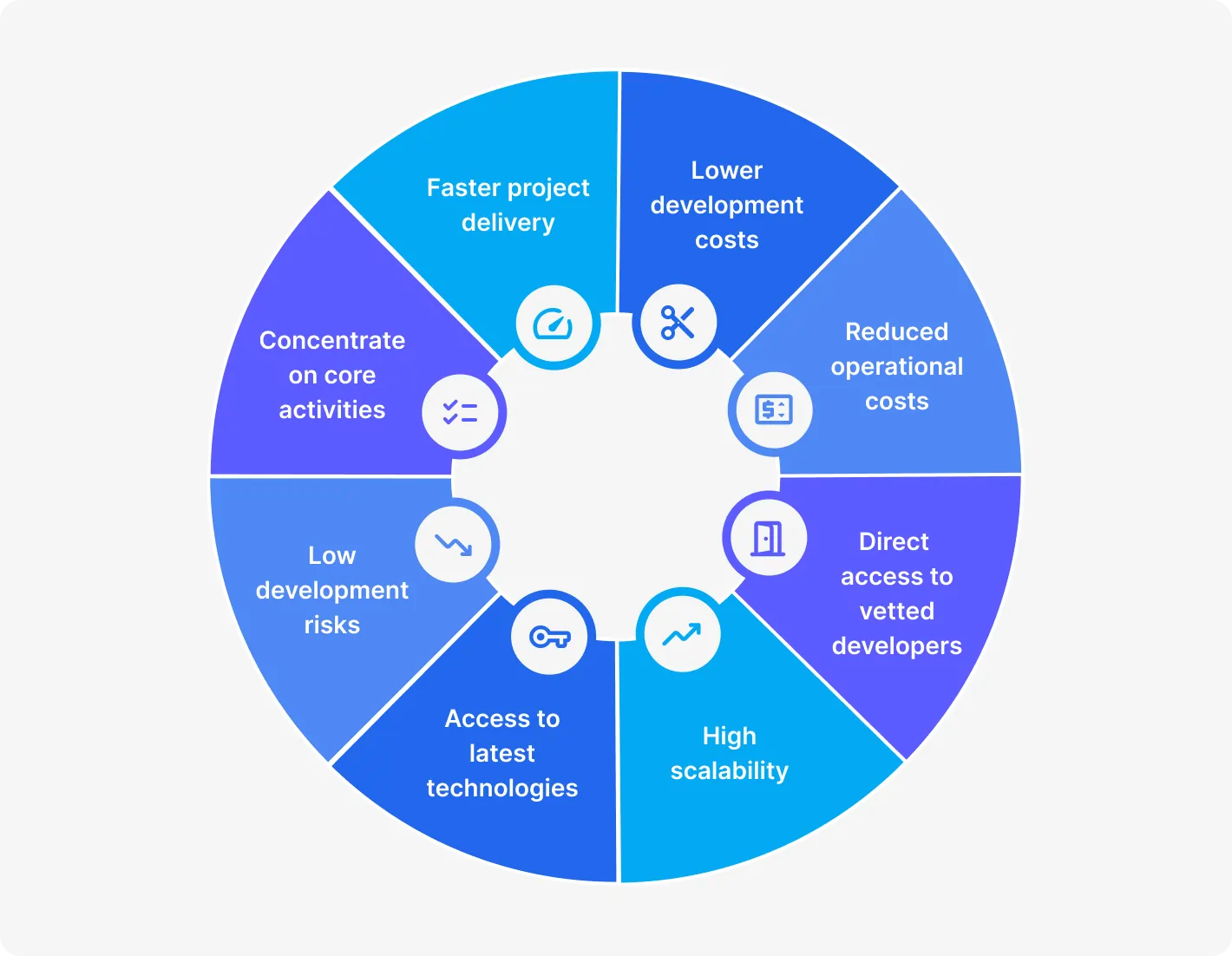A skills shortage is impacting the future of software development worldwide. According to the Statista, more than half of the surveyed global companies have experienced a skills shortage, making it harder to hire offshore developers or local ones. In 2023, 54% of companies still lacked technology skills, but this is not because the job market is stagnant.
Actually, the number of job opportunities for software developers is set to increase by 22% in 2030, which raises the stakes for startups learning how to find a developer for your startup. Still projects experience this shortage because they cannot find the ideal candidate for themselves.
This situation also affects the value proposition of domestic developers and software engineers, making it more cost-effective to hire offshore development team support. So, hiring them ends up being too expensive for most of the startups. Moreover, it may not be profitable to hire them locally because:
there are no right professionals locally, so many startups decide to hire offshore developer talent;
there is lack of required expertise;
it is more profitable to hire developers from countries with weaker currency.
Offshore hiring lets startups access global talent at lower costs, especially for niche skills like AI/ML, data engineering, or Java. With demand for top talent rising, many entrepreneurs consider hiring offshore developers.
But is it truly beneficial? This article explores the pros and cons, from cost savings and specialized expertise to the challenges of managing remote teams.
Should you skip in-house hiring for outsourcing?
According to recent reports, businesses spent over $700 billion on outsourcing. Breaking this down by segment, IT outsourcing spending was projected to reach $519 billion, much of it driven by companies that hire offshore development team support. Business process outsourcing spending was forecast at $212 billion.
Moreover, companies are increasingly turning to workers who are abroad to replace laid-off U.S. employees. For example, Google recently cut hundreds of core workers and chose to hire offshore developers in India and Mexico. Yet, it doesn’t mean that in-house hiring is dying, as according to the survey conducted by Mayple 42% of companies still prefer to be completely in-house, so let’s compare these two.
Criteria for comparing in-house hiring vs outsourcing
Criteria
In-house hiring
Outsourcing
- Higher long-term operational expenses.
- Requires salaries, benefits, and training.
- Generally offers significant cost savings.
- Potential hidden costs may arise from quality issues.
- Higher quality and consistency are expected.
- Quality can vary based on recruitment methods.
- Access to specialized expertise.
- Risk of lower quality due to communication issues.
- Greater control over processes and performance.
- Easier to foster team collaboration.
- Less control over external teams.
- Requires effective management of outsourced teams.
- Longer recruitment and training processes.
- Stability and continuity lead to more efficient processes.
- Rapid onboarding of skilled workers.
- Flexibility to scale operations based on needs.
- Slower to scale due to hiring and training delays.
- Institutional knowledge benefits long-term projects.
- Quick scalability allows for adjusting to demands.
- Fluctuating quality risks with multiple vendors.
Employee morale and culture
- Strengthens company culture and loyalty.
- Layoffs for outsourcing can harm morale.
- Can free in-house staff for more value-added tasks.
- Risk of creating an “us vs. them” mentality.
The choice between in-house hiring and software development outsourcing depends on a company’s goals, resources, and specific needs. In-house hiring allows for better quality control and alignment with company culture, though it can be costlier and slower to adapt. Outsourcing offers cost savings and the ability to scale quickly but may come with risks related to quality, control, and team cohesion.
It must be said that companies find that a hybrid approach – maintaining in-house talent for core functions while outsourcing non-core activities – can provide a balanced solution that maximizes the benefits of both strategies.
Offshore software development challenges
Even though offshoring is a valuable strategy, anyone trying to hire offshore developers will face some challenges. Managing these challenges requires technical expertise, project management skills, and cultural awareness.
Time zone differences
Different time zones can influence communication and project timelines, so learning how to hire offshore software developers includes planning around this.
Communication delays
If the members of the team are in different time zones, you will probably have just a few hours of overlap in which real-time interactions can take place. This can lead to the undesirable delay in email/Slack communication. For example, if your core project team, which is located in New York (EST), has a question or clarification of a task with a developer in India (IST), a 3 PM EST request might not be reviewed until the next morning in New York, thus creating a 12- to 15-hour delay. However, with proper scheduling, effective use of communication tools, and overlapping work hours, these challenges can be mitigated, ensuring smooth collaboration and timely project delivery. For example, JPMorgan Chase & Co’s profit for 2024 rose 18% to $58.5 billion with offshoring teams in the Philippines.
Scheduling challenges
If the team members are in different time zones, startups that hire offshore developers may find it complicated to schedule meetings or work sessions. For example, if a team meeting is scheduled at 10 AM PST, it would be 1 PM EST and 6 PM GMT. It might be inconvenient or even difficult for participants in other zones, especially those in Asia, where it might fall early in the morning, causing problems in attendance.
However, these challenges can be effectively managed. Use virtual meeting tools like Zoom or Microsoft Teams and you will be able to facilitate collaboration across time zones. Utilizing scheduling tools like When2meet or Doodle allows everyone to indicate their availability, making it easier to find a suitable time for all participants. Additionally, using a time zone converter like World Time Buddy can help visualize these differences, ensuring better coordination and fostering greater participation.
Impact on project timelines
Time zones can contribute to delays in project milestones when interdependent tasks rely on asynchronous communication. If one team cannot start until approvals come from another time zone, this bottleneck is a common issue for offshore developers. Suppose a marketing team in Australia relies on analytics data from a team in Ukraine.
If the Ukrainian team completes the analysis only after their workday ends, the Australian team might experience a delay in developing their campaign strategy by an entire day. This problem can be easily solved with the set we have mentioned above.
Time zone differences pose challenges to global teams, especially in terms of communication, collaboration, and project timelines. However, these challenges can be effectively managed through thoughtful scheduling, the adoption of asynchronous communication tools, and clear processes that account for the delays caused by time differences. Proactively addressing these issues can lead to successful project outcomes, regardless of geographical location.
How does the offshore time difference work in your favor?
Lack of face-to-face communication
A lack of face-to-face communication can reduce collaboration quality, which is a common challenge for startups that hire offshore developers and rely on remote teams.
Moreover, it is difficult to maintain the same quality standards within a team spread across different geographic locations. Different work practices, policies, and quality control measures can impact the overall quality of products or services.
Imagine, during the critical moment of product launch, a development team in Eastern Europe requires instant feedback from the business operations team, which is based in North America. If offshore requests are sent in the evening, startups that hire offshore software developers may face delays in getting critical feedback.
To address these challenges, organizations can use specific tools to enhance communication and collaboration among remote teams, like Slack, Asana, Trello or Miro.
Cultural differences
Offshoring involves working with teams from different cultures, which can lead to communication barriers, misunderstandings, and problems aligning work processes and expectations.
Different cultures also bring varying expectations around work hours and responsiveness. In some cultures, teams may respond instantly, while in others work-life balance is prioritized — a key nuance for anyone learning how to hire offshore software developers.
A team in Latin America may operate differently than a team in East Asia, where there may be expectations around availability after traditional business hours. Misunderstanding these cultural nuances can lead to frustration and misalignment of project goals.
Understand and respect different cultural practices, such as varying attitudes toward hierarchy, deadlines, and decision-making processes. Addressing these challenges ensures that offshore developers can create projects that fully meet client needs and goals.
Benefits of hiring offshore developers
In this section, we'll explore the numerous benefits of hiring offshore developers, including cost savings, access to specialized skills, improved project efficiency, and enhanced business agility.
Price-to-quality ratio
Companies use offshore jobs to reduce costs. A typical software developer in the USA earns about $105,706. In contrast, in Eastern Europe, the average salary ranges from $48,000 to $54,500 per year, which makes it one of the cheapest regions to hire software developers. These large wage differentials make it very attractive for companies to lower costs by substituting U.S. workers with overseas developers.
As Brian Jackson, CEO of a major technology company, put it, “If you can find high-quality talent at a third of the price, it’s not too hard to see why you’d send jobs offshore.” By lowering costs through offshoring, firms can gain a business advantage over their competitors.
Reduced time-to-market
When startups hire offshore developers, they can accelerate product development and reduce time-to-market.
24/7 development cycles. Offshore teams located in different time zones can provide round-the-clock productivity. Work can continue outside traditional business hours, allowing for continuous progress on projects.
Focus on core competencies. One benefit of having some development components outsourced offshore is that they can free up core competency work by in-house teams to focus on strategic initiatives.
Agile development practices. Offshore teams can adopt agile methodologies, allowing for iterative development processes that facilitate faster pivots and improvements based on feedback.
Pre-built frameworks and solutions. Offshore teams bring established frameworks, tools, and best practices that can accelerate development and minimize redundant work.
Scalability and flexibility. Offshore teams can be quickly scaled up or down based on project needs. This flexibility allows companies to respond swiftly to market demands and deadlines.
Pre-vetted talent pool
Accessing a pre-vetted pool of skilled startup developers offers big advantages for companies streamlining their hiring.
Reduced hiring time
Pre-vetted talent pools consist of candidates who have already gone through rigorous screening processes, ensuring that only qualified individuals are presented for potential roles. This minimizes the time spent on searching, interviewing, and vetting new hires. For instance, if you are looking for a development team, then an IT outstaffing company can significantly shorten the recruitment timeline from weeks or months to just a few days.
Increased quality of candidates
The pre-vetting process ensures offshore developers are tested for skills, problem-solving, and cultural fit. For instance, when Devico assesses candidates we use the following steps to do that:
-
Communication & English language skills
-
Technical assessment
-
Teamwork, problem solving & ownership evaluation
-
Commercial project readiness
This means that employers can expect higher-quality candidates who meet their specific requirements.
Lower risk of turnover
Pre-vetted candidates are more aligned with the company's needs and culture, leading to better job satisfaction and lower turnover rates. When the right candidates are matched to the proper roles, they are more likely to stay long-term.
Faster onboarding
Seasoned and tested developers come equipped with the skills and knowledge necessary to hit the ground running. This leads to faster onboarding processes and reduces the time it takes for new hires to contribute effectively. A development team can onboard a new developer from a pre-vetted pool and have them start contributing to live projects within days rather than weeks, accelerating project timelines.
Diversity of skills and expertise
Pre-vetted talent pools typically include a diverse range of skills, experiences, and backgrounds. This can enhance creativity and innovation within offshore software development teams. A global tech firm can access developers proficient in different programming languages, methodologies, and industries, allowing for a well-rounded approach to problem-solving.
Accessing a pre-vetted pool of skilled developers offers numerous advantages, including reduced hiring times, increased candidate quality, lower turnover rates, and cost efficiencies. This way, companies can streamline their recruitment processes and speed up project timelines, leading to greater success in a competitive market.
Cut cost
Companies that hire PEOs — professional employer organizations — can cut costs by outsourcing HR functions like hiring, recruiting, compliance, and managing unemployment claims. A study by NAPEO found that the average cost savings from hiring a PEO can lead to a 27.2% ROI.
Should you hire an outsourcing company or freelancers?
When deciding between an outsourcing company or freelancers, startups should weigh factors like scope, budget, and timelines – the same considerations apply when you hire offshore developers for startup growth.
Criteria
Outsourcing companies
Freelancers
Yes, it offers a range of services
No, may require multiple freelancers
Diverse team with specialists available
Individual skill set only
Well-defined workflows and methodologies
May vary and can be inconsistent
Can quickly scale resources
Limited by individual capacity
Established track record, typically more dependable
Variable, can vary greatly in professionalism
Higher rates due to overhead
Usually lower cost options
Slower to adapt to project changes
More adaptable to evolving needs
Potential dilution of communication
More communication layers are involved
Criteria for startups to consider
When it comes to deciding how to manage your projects and resources effectively, understanding your options is crucial.
So, what way to choose – offshore hiring, in-house team or freelancer? For your convenience, we’ve outlined criteria to help you select the best approach, whether you hire offshore programmers, freelancers, or full-time staff.
Criteria 1: Project scope and complexity
Select an outsourcing company: For large, complex projects requiring diverse skill sets and long-term support.
Choose freelancers: For smaller, well-defined tasks or projects with a clear scope.
Consider in-house: If the project requires deep knowledge of your company’s product or culture, or if collaboration with other internal teams is crucial for success.
Criteria 2: Budget
Pick an outsourcing company: If your budget allows and you value comprehensive services and reliability.
Choose freelancers: If working with tighter budget constraints, as they often provide lower rates.
Consider in-house: If you foresee the potential for cost savings over time through the development of internal capabilities instead of continual outsourcing expenses.
Criteria 3: Timeframe and urgency
Choose an outsourcing company: If you need a team that can quickly scale for rapid delivery.
Choose freelancers: If you're able to manage less urgency and can afford to onboard talent individually.
Consider in-house: If you have a non-urgent project that necessitates dedicated attention.
Criteria 4: Level of control
Select an outsourcing company: If your startup needs a more hands-off approach and prefers established project management protocols.
Choose freelancers: If you want more direct control over every aspect of the project and prefer communicating directly with the person completing the work.
Consider in-house: If you need full oversight and rapid adjustments to the project since in-house teams can be more readily accessible and adaptable to changes.
Criteria 5: Quality assurance needs
Pick an outsourcing company: For projects where quality assurance and consistency are critical, as companies often have structured processes in place.
Choose freelancers: If you are prepared to invest time in quality checks and are willing to supervise work closely.
Consider in-house: If your project demands meticulous quality control and alignment with brand standards, as in-house teams can better maintain oversight and adherence to your specific quality benchmarks.
Criteria 6: Skill diversity requirement
Select an outsourcing company: When you require access to multiple skill sets simultaneously across development, design, and marketing.
Choose freelancers: For specifics, niche skill sets, or tasks that don’t necessitate a collaborative effort.
Consider in-house: If your startup values an integrated team culture and collaboration, where various skill sets can contribute directly to the company’s mission and vision.
Criteria 7: Long-term vs. Short-term engagement
Select an outsourcing company: If you anticipate ongoing work and wish to establish a long-term offshore technology partner.
Choose freelancers: Choose freelancers for one-off projects — but for scaling, many startups eventually hire overseas programmers to fill ongoing roles.
Consider in-house: If you are positioning for long-term growth and believe building a robust internal team will provide ongoing value and deepen expertise aligned with your company’s goals.
These criteria will help you decide the method that will be just right for you.
How to get IT staff augmentation right
Why hire offshore developers for startups with Devico?
Hiring offshore developers has become an increasingly popular strategy for startups looking to optimize their resources while driving innovation and growth. Partnering with a company like Devico can provide several advantages tailored to the unique needs of startups, such as lower cost of hiring, faster processes, and access to the best experts.
Devico specializes in staff augmentation services and connecting startups with skilled developers worldwide, offering a range of services designed to maximize efficiency and reduce costs.
With a professional staff augmentation services provider at their side, startups can focus on innovation and growth while ensuring their development needs are met with high-quality standards and effective communication.
Conclusion
Hiring offshore developers isn’t just cost-saving, it’s a growth strategy. Startups can scale faster, tap into world-class talent, and stretch their resources further. The risks? Real, but manageable. With an experienced partner like Devico, challenges become opportunities, and speed turns into market advantage.
The real question isn’t if you should hire offshore, it’s how you’ll make it work. With the right partner, the upside is limitless.
Motivated and focused experts for up to 60% less than locals, delivered in days, not months




